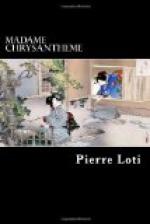And every evening, in the little dark streets, bursts forth this overflow of joyousness, fresh, childish, but withal grotesque to excess. It would be difficult to have any idea of the incredible things which, carried by the wind, float in the evening air.
XXXIX.
Little Chrysantheme is always arrayed in dark colors, a sign here of aristocratic distinction. While her friends Oyouki-San, Madame Touki and others delight in loud-striped stuffs, and stick gorgeous ornaments in their chignons, she always wears navy-blue or neutral gray, fastened round her waist with great black sashes brocaded in tender shades, and puts nothing in her hair but amber-colored tortoise-shell pins. If she were of noble descent she would wear embroidered on her dress in the middle of the back a little white circle looking like a postmark with some design in the center of it—the leaf of a tree generally; and this would be her coat of arms. There is really nothing wanting but this little heraldic blazon on the back to give her the appearance of a lady of the highest position.
In Japan the smart dresses of bright colors shaded in clouds, embroidered with monsters of gold or silver, are reserved by the great ladies for home use on state occasions; or else they are used on the stage for the dancers and the courtesans.
Like all Japanese women, Chrysantheme carries a quantity of things in her long sleeves, in which pockets are cunningly hidden. There she keeps letters, various notes written on delicate sheets of rice-paper, prayer amulets drawn up by the bonzes; and above all a number of squares of a silky paper which she puts to the most unexpected uses,—to dry a tea-cup, to hold the damp stalk of a flower, or to blow her quaint little nose, when the necessity presents itself. After the operation she at once crumples up the piece of paper, rolls it into a ball, and throws it out of the window with disgust.
The very smartest people in Japan blow their noses in this manner.
XL.
September 2nd.
Chance has favored us with a friendship as singular as it is rare: that of the head bonzes of the temple of the Jumping Tortoise, where we had witnessed last month such a surprising pilgrimage.
The approach to this place is as solitary now as it was thronged and bustling on the evenings of the festival; and in broad daylight one is surprised at the deathlike decay of the religious surroundings which at night had seemed so full of life. Not a creature to be seen on the time-worn granite steps; not a creature beneath the vast sumptuous porticoes; the colors, the gold-work are dim with dust. To reach the temple one must cross several deserted courtyards terraced on the mountain side, pass through several solemn gateways, and up and up endless stairs, rising far above the town and the noises of humanity into a sacred region filled with innumerable tombs. On all the pavements, in all the walls, lichen and stonecrop; and over all the gray tint of extreme age spreads everywhere like a fall of ashes.




